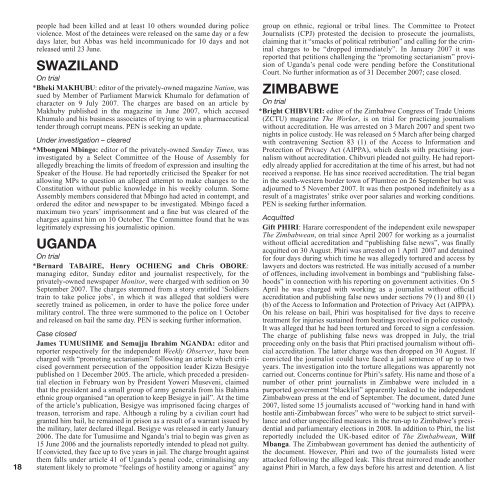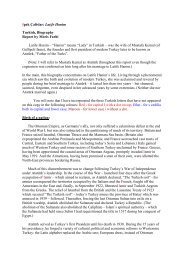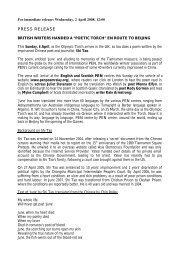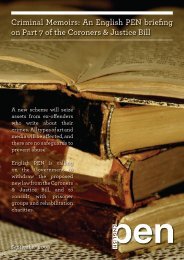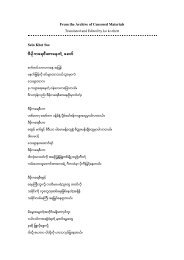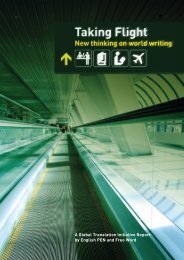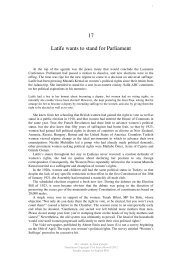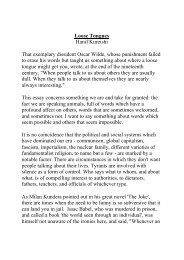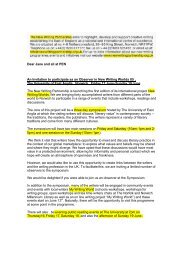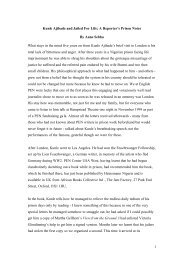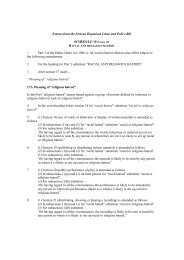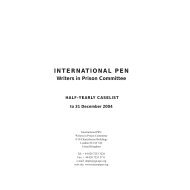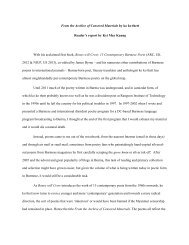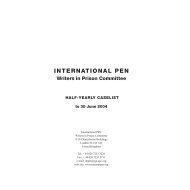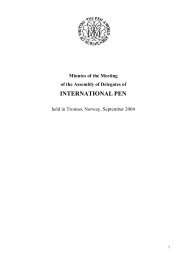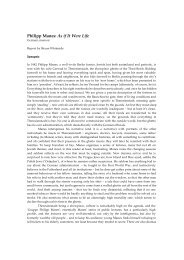Download - English PEN
Download - English PEN
Download - English PEN
You also want an ePaper? Increase the reach of your titles
YUMPU automatically turns print PDFs into web optimized ePapers that Google loves.
18<br />
people had been killed and at least 10 others wounded during police<br />
violence. Most of the detainees were released on the same day or a few<br />
days later, but Abbas was held incommunicado for 10 days and not<br />
released until 23 June.<br />
SWAZILAND<br />
On trial<br />
*Bheki MAKHUBU: editor of the privately-owned magazine Nation, was<br />
sued by Member of Parliament Marwick Khumalo for defamation of<br />
character on 9 July 2007. The charges are based on an article by<br />
Makhuby published in the magazine in June 2007, which accused<br />
Khumalo and his business associates of trying to win a pharmaceutical<br />
tender through corrupt means. <strong>PEN</strong> is seeking an update.<br />
Under investigation – cleared<br />
*Mbongeni Mbingo: editor of the privately-owned Sunday Times, was<br />
investigated by a Select Committee of the House of Assembly for<br />
allegedly breaching the limits of freedom of expression and insulting the<br />
Speaker of the House. He had reportedly criticised the Speaker for not<br />
allowing MPs to question an alleged attempt to make changes to the<br />
Constitution without public knowledge in his weekly column. Some<br />
Assembly members considered that Mbingo had acted in contempt, and<br />
ordered the editor and newspaper to be investigated. Mbingo faced a<br />
maximum two years’ imprisonment and a fine but was cleared of the<br />
charges against him on 10 October. The Committee found that he was<br />
legitimately expressing his journalistic opinion.<br />
UGANDA<br />
On trial<br />
*Bernard TABAIRE, Henry OCHIENG and Chris OBORE:<br />
managing editor, Sunday editor and journalist respectively, for the<br />
privately-owned newspaper Monitor, were charged with sedition on 30<br />
September 2007. The charges stemmed from a story entitled ‘Soldiers<br />
train to take police jobs’, in which it was alleged that soldiers were<br />
secretly trained as policemen, in order to have the police force under<br />
military control. The three were summoned to the police on 1 October<br />
and released on bail the same day. <strong>PEN</strong> is seeking further information.<br />
Case closed<br />
James TUMUSIIME and Semujju Ibrahim NGANDA: editor and<br />
reporter respectively for the independent Weekly Observer, have been<br />
charged with “promoting sectarianism” following an article which criticised<br />
government persecution of the opposition leader Kizza Besigye<br />
published on 1 December 2005. The article, which preceded a presidential<br />
election in February won by President Yoweri Museveni, claimed<br />
that the president and a small group of army generals from his Bahima<br />
ethnic group organised “an operation to keep Besigye in jail”. At the time<br />
of the article’s publication, Besigye was imprisoned facing charges of<br />
treason, terrorism and rape. Although a ruling by a civilian court had<br />
granted him bail, he remained in prison as a result of a warrant issued by<br />
the military, later declared illegal. Besigye was released in early January<br />
2006. The date for Tumusiime and Nganda’s trial to begin was given as<br />
15 June 2006 and the journalists reportedly intended to plead not guilty.<br />
If convicted, they face up to five years in jail. The charge brought against<br />
them falls under article 41 of Uganda’s penal code, criminalising any<br />
statement likely to promote “feelings of hostility among or against” any<br />
group on ethnic, regional or tribal lines. The Committee to Protect<br />
Journalists (CPJ) protested the decision to prosecute the journalists,<br />
claiming that it “smacks of political retribution” and calling for the criminal<br />
charges to be “dropped immediately”. In January 2007 it was<br />
reported that petitions challenging the “promoting sectarianism” provision<br />
of Uganda’s penal code were pending before the Constitutional<br />
Court. No further information as of 31 December 2007; case closed.<br />
ZIMBABWE<br />
On trial<br />
*Bright CHIBVURI: editor of the Zimbabwe Congress of Trade Unions<br />
(ZCTU) magazine The Worker, is on trial for practicing journalism<br />
without accreditation. He was arrested on 3 March 2007 and spent two<br />
nights in police custody. He was released on 5 March after being charged<br />
with contravening Section 83 (1) of the Access to Information and<br />
Protection of Privacy Act (AIPPA), which deals with practising journalism<br />
without accreditation. Chibvuri pleaded not guilty. He had reportedly<br />
already applied for accreditation at the time of his arrest, but had not<br />
received a response. He has since received accreditation. The trial began<br />
in the south-western border town of Plumtree on 26 September but was<br />
adjourned to 5 November 2007. It was then postponed indefinitely as a<br />
result of a magistrates’ strike over poor salaries and working conditions.<br />
<strong>PEN</strong> is seeking further information.<br />
Acquitted<br />
Gift PHIRI: Harare correspondent of the independent exile newspaper<br />
The Zimbabwean, on trial since April 2007 for working as a journalist<br />
without official accreditation and “publishing false news”, was finally<br />
acquitted on 30 August. Phiri was arrested on 1 April 2007 and detained<br />
for four days during which time he was allegedly tortured and access by<br />
lawyers and doctors was restricted. He was initially accused of a number<br />
of offences, including involvement in bombings and “publishing falsehoods”<br />
in connection with his reporting on government activities. On 5<br />
April he was charged with working as a journalist without official<br />
accreditation and publishing false news under sections 79 (1) and 80 (1)<br />
(b) of the Access to Information and Protection of Privacy Act (AIPPA).<br />
On his release on bail, Phiri was hospitalised for five days to receive<br />
treatment for injuries sustained from beatings received in police custody.<br />
It was alleged that he had been tortured and forced to sign a confession.<br />
The charge of publishing false news was dropped in July, the trial<br />
proceeding only on the basis that Phiri practised journalism without official<br />
accreditation. The latter charge was then dropped on 30 August. If<br />
convicted the journalist could have faced a jail sentence of up to two<br />
years. The investigation into the torture allegations was apparently not<br />
carried out. Concerns continue for Phiri’s safety. His name and those of a<br />
number of other print journalists in Zimbabwe were included in a<br />
purported government “blacklist” apparently leaked to the independent<br />
Zimbabwean press at the end of September. The document, dated June<br />
2007, listed some 15 journalists accused of “working hand in hand with<br />
hostile anti-Zimbabwean forces” who were to be subject to strict surveillance<br />
and other unspecified measures in the run-up to Zimbabwe’s presidential<br />
and parliamentary elections in 2008. In addition to Phiri, the list<br />
reportedly included the UK-based editor of The Zimbabwean, Wilf<br />
Mbanga. The Zimbabwean government has denied the authenticity of<br />
the document. However, Phiri and two of the journalists listed were<br />
attacked following the alleged leak. This threat mirrored made another<br />
against Phiri in March, a few days before his arrest and detention. A list


